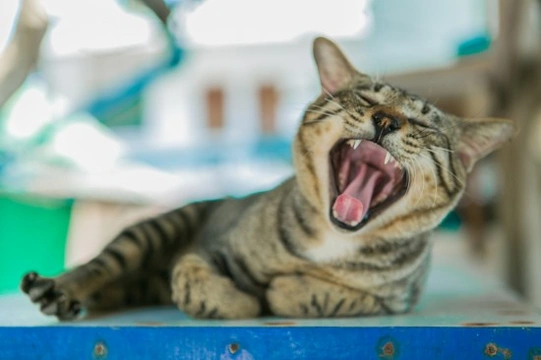
Indications that your cat’s teeth are bothering them
We all know how common it is for people to suffer from dental problems, even with daily brushing and good preventative care routines. Few of us are lucky enough to go through our whole lives without a filling, occasional issue or some kind of incident that requires dental treatment, and yet many pet owners are also surprised to learn that cats can suffer from problems with their teeth too!
Added to the fact that cats go through their whole lives with their adult teeth and likely no brushing (although vets and clinics are trying hard to promote dental care in cats from a young age) cats are very good at masking pain, and often, you might not be aware that they are suffering from a problem until it has become very pronounced. For this reason it is very important to keep an eye out for some of the main signs that your cat’s teeth are bothering them, particularly when they get older; although it is also important to bear in mind that dental problems in the cat can come on at any age.
Read on to learn about some of the key signs that your cat’s teeth are bothering them.
Bad breath
As a reasonable amount of older cats tend to have bad breath, it is often assumed that this is a normal, if unpleasant, side effect of feline aging. However, bad breath does not happen of its own accord for no good reason, and bad breath is always accompanied by another issue such as bad gums, rotting teeth, or even problems with the digestive system.
If your cat’s breath is bad, they need to get checked out by your vet, who can perform a full dental procedure to remove any bad teeth, treat sore or rotting gum tissue and generally get their mouths back into good health for life.
Chewing on one side of the mouth
Watching your cat when they are eating can tell you a lot about the state of their teeth, and one of the clearest indicators of a problem with the teeth or gums is if your cat very much favours one side of the mouth when chewing, and appears to avoid biting down on a particular area of the mouth.
Dropping food
Cats are fairly fastidious eaters, and pick up their food delicately, chew and swallow it before picking up another piece of their meal. If your cat drops food out of their mouth a lot, this may be because they are trying to avoid biting or putting pressure on a painful area, causing them to try to eat around it and making eating a longer process than normal, as they will be apt to keep dropping food.
Swallowing food whole
Cats chew both soft food and kibble, in order to break it up into small enough pieces to swallow comfortably. If your cat’s teeth are causing them pain when eating, they might swallow the smaller pieces of their food whole in order to avoid the pain that comes from biting and chewing, so if your cat does not appear to chew much or at all, get them checked out.
Drooling
The salivary glands within the mouth will often kick up a notch if your cat is suffering from dental pain, which can lead to them slobbering or drooling a lot when eating, or when sleeping or otherwise relaxed. If your cat starts slobbering or drooling on occasion and they have not always done this, get them checked out by your vet.
Loss of appetite
Loss of appetite in the cat can be a symptom of a whole host of potential problems, from minor ills that will go away on their own within a day or so to more serious issues.
If your cat appears to be hungry and is asking for food, or appears interested in their food but reluctant or unable to eat, a broken tooth, abscess or other problem might be the cause, which again, will require veterinary treatment. The same may be true if your cat refuses to eat kibble but can manage better with wet food, although for some cats, this is simply down to personal preference!
Obvious problems
Cats are not big fans of having their mouths opened or examined, but taking a quick look now and then might also alert you of an anomaly or dental problem in the making. Get to know the normal appearance of your cat’s mouth, and look out for problems such as inflamed gums, broken or missing teeth, plaque and tartar build up, and grey-looking teeth, which indicates that the root is dead.
If you can do, start getting your cat used to having their teeth brushed a couple of times a week when they are young, and ensure that your cat has a dental check up every year when they get their annual booster vaccinations.



